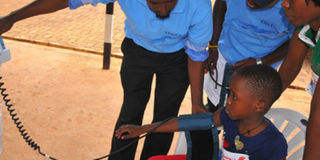What causes high blood pressure in children?

A young girl gets her blood pressure level checked at a recent public health camp. photo by Geoffrey Sseruyange
What you need to know:
When the heart beats, it pumps blood into the arteries, and blood pressure is highest when the heart beats, pumping the blood.
Often times, having high blood pressure has been associated with fat, older people. However, doctors say with younger people including children being diagnosed with the condition, more attention needs to be put on ensuring proper management of the condition. So, what is causing this shift?
Dr Yaser Abdallah, a paediatrician at International Hospital Kampala (IHK) says high blood pressure happens when the force of blood pushes against the wall of the arteries. When the heart beats, it pumps blood into the arteries, and blood pressure is highest when the heart beats, pumping the blood.
“In children, cases of hypertension depend on various factors. For instance blood pressure can be as a result of abnormalities such as the narrowing of the aorta that drains blood from the heart to the rest of the body. When vessels are damaged, it makes the heart push hard against the blood vessels, which leads to blood pressure,” he says.
According to Dr Abdallah, organ-related abnormalities such as kidney cancer are also associated with paediatric high blood pressure. “Tumours disrupt the function of the kidney to be able to clear excess water in the body, which may therefore result in rising of the blood pressure.
He adds: “Lack of oxygen supply to the brain at birth or a clot within the vessels supplying and draining the kidney also have an impact on hypertension cases in children.” According to health experts, paediatric high blood pressure could also result from chronic lung diseases and having abnormal sugar levels.
However, obesity also remains a contributing factor to childhood high blood pressure, just as is the case with adults.
Treatment
Dr Abdallah says treatment depends on the degree of the blood pressure. “In a pre-hypertension state, no treatment may be required except addressing the likely risk factors. If the child’s blood level is high but without symptoms, they may need a period of observation, change in lifestyle and diet, regular exercise and frequent medical check-up,” he says.
He, however, adds that if the blood pressure is significantly high, the child may need treatment from a specialist to prevent complications such as heart and kidney failure or stroke. “All children diagnosed with high blood pressure must be investigated first in order to establish the possible cause of their condition before treatment is administered,” says Dr Abdallah.




